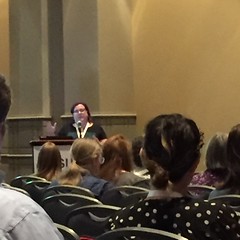There was a lot of content in this session and much of it went by too fast. I hope the presenters place their presentations online.
Elaine Lasda - Teaching data literacy to undergraduates (Her presentation is online here.)University of Albany has a strong literacy component to its curriculum. It fits into the curriculum in different ways,including information literacy for math and statistics, e.g., UNL 299.
Data Literacy Concepts:
- Quality
- Context
- Authority
- How is it created, documented, etc.
Lasda began her lesson for the class with a hands-on assignment. She used data from New York State and noted that NYS has very good data available. She then does a lecture. Over time she has shortened the lecture, because the lecture has not gone over well. In the future, rather than a lecture she is going to use discussion question. She had ended her guest lecture with a survey/assessment.
Lasda is looking to expanding this class/concept to other disciplines.
Michael Fosmire - Teaching Data Literacy at the Graduate Level
DIL: the problem
Students should know this by now
Students don't know what they should know
Students weren't introduced to this as undergrads
DIL competencies:
- Database and data formats
- Understand principles of relational databases
- Understand standard formats of discipline
- Under appropriate formats for research questions
- Discovery and acquisition of data
- Locate and utilize disciplinary data repositories
- Evaluate quality of data located
- Recognize practices
- Recognize standards
- Data conversion and interoperability
- Can migrate data
- Understand benefits of standard formats
- Understand risk of loss and corruption
- Curation and reuse
- Data Management and organization
- Data preservation
- Data process and analysis
- Data quality and documentation
- Data visualization
- Ethics and attribution
- Metadata and data description
What is unique abut grad students? They are highly motivated. Need guidance. Do not want busy work.
In terms of instruction the options are:
- Workshops - target, at the point of need,hands-on
- Create a "Data Day" - might do during a semester break because graduate students frequently stay in town then.
- Get a GRIP on your research promotion and programs
- More depth, more engagement
- Includes a portal
- Http://guides.lib.purdue.edu/grip
- Credit bearing courses
- Data methods , etc.
- Geoinformatics course - from locate to deposit
- Data Methods course
- Research lab consultations
- Interview
- Plan - introduce the concepts in relation to the research lab itself. Scaffold the topics.
- Deploy
- Created specific activities for the students.
Stefanie Maclin-Hurd, EBSCO
Talked about training staff on data and specifically on the use of ILS data.
Updated: 06/17/2016& 6/26/2016
Updated: 06/17/2016& 6/26/2016

No comments:
Post a Comment